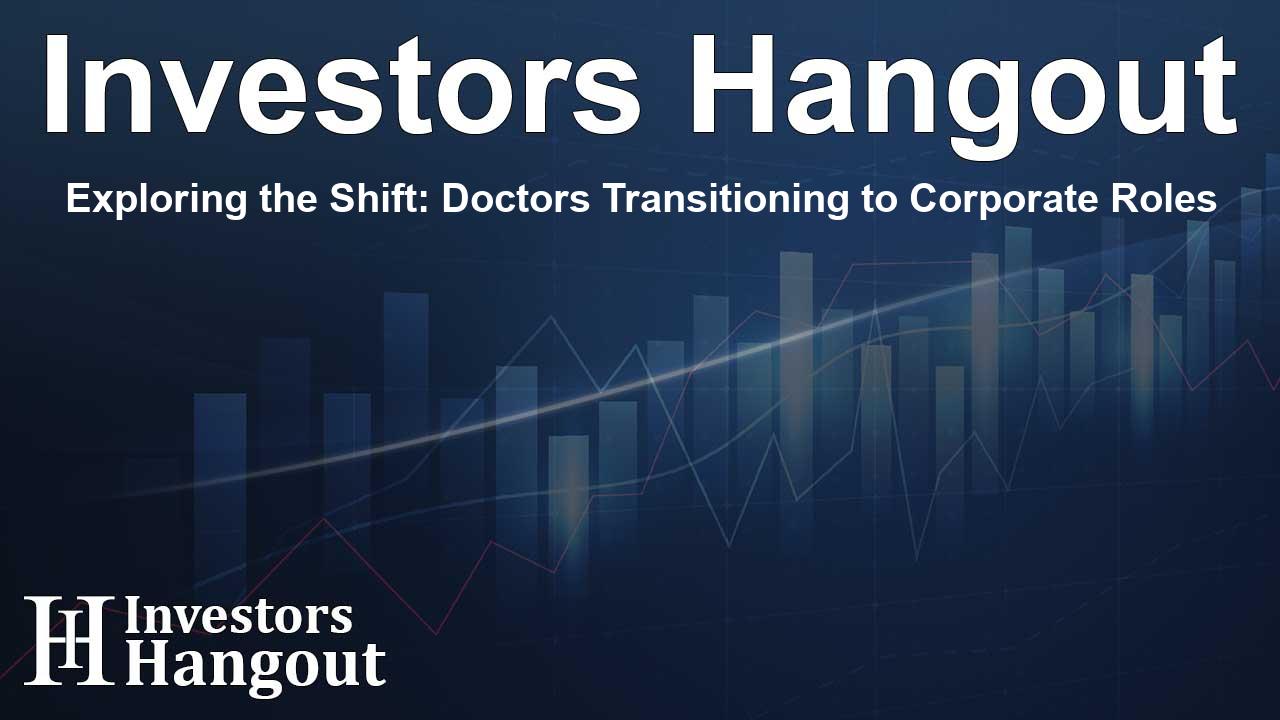Exploring the Shift: Doctors Transitioning to Corporate Roles

The Shift from Clinical to Corporate: An Overview
Recent trends show a growing number of doctors are making the leap from the demanding world of clinical practice to corporate leadership roles. With lucrative salaries averaging around $275,000, more accommodating work hours, and reduced stress levels, this shift is attracting many professionals seeking a healthier work-life balance.
Why the Transition is Happening
Among those making the change is Dr. Lisa Shah, who transitioned to a Chief Medical Officer (CMO) role at Twin Health, a health tech startup. While she cherished her time treating patients, the toll of daily exhaustion and emotional strain from patient losses prompted her to seek a position where her impact could be amplified.
Transforming Healthcare on a Larger Scale
Dr. Shah’s decision reflects a broader movement among healthcare professionals. As the demand for medical oversight in tech firms grows, doctors find themselves in positions where they can influence healthcare outcomes on a significant level.
The Role of Chief Medical Officers in the Industry
With a sharp increase in healthcare technology companies, the need for medical leadership has surged. As reported, industries ranging from startups to established corporations like Salesforce and Google are eagerly employing chief medical officers to infuse clinical validity into their product development. This crossover of skills helps bridge the gap between the medical and business worlds.
Impact of the Pandemic on Career Choices
The COVID-19 pandemic acted as a catalyst, exacerbating burnout among healthcare workers. A survey by Bain & Company noted that a significant portion of clinicians were contemplating leaving medicine. The realities of long shifts and emotional strain have led many to consider alternative career paths that offer similar pay without the grueling hours.
The Financial Advantages of Transitioning
Current data shows that CMO roles can offer competitive salaries. According to ZipRecruiter, CMOs earn around $275,000 annually, rivaling the compensation of practicing physicians but without the sacrifices of being on call or managing patient care.
Emerging Trends in Health Tech
The health tech sector is anticipated to reach a remarkable $1.5 trillion by the early 2030s, fueling job creation that demands expertise from qualified doctors. This boom creates opportunities for professionals like Dr. Guy Maytal, who transitioned from nearly two decades in psychiatry to Forge Health, a company focused on mental health solutions.
Embracing the Challenge
For many physicians, the decision to move into a corporate environment presents not just a new job, but a chance to reshape the system from within. Dr. Maytal expressed his desire to actively participate in improving mental health care rather than merely criticizing existing structures.
Challenges and Adaptations in Corporate Roles
While some find the corporate environment invigorating, it isn't without its challenges. Dr. Nikole Benders-Hadi, CMO at Talkspace, emphasizes the need to communicate effectively with professionals outside the healthcare sector. Bridging the gap between medical and business objectives is crucial as these doctors navigate their new roles.
A Necessary Evolution
Many professionals believe that the rise of CMOs is a positive evolution for the healthcare landscape. As America anticipates a shortage of physicians, the innovative ideas brought forth by CMOs can provide necessary solutions to improve care delivery. Dr. Nate Favini, CMO at Pair Team, highlighted the potential of leveraging technology to enhance patient care efficiently.
Conclusion: A New Era for Medicine
Ultimately, the migration of physicians into corporate roles signifies a transformative moment in healthcare. Rather than abandoning their medical roots, these professionals are redefining the future of medicine itself, using their expertise to foster significant improvements in the industry.
Frequently Asked Questions
What are the main reasons doctors are leaving clinical practice for corporate roles?
Doctors are seeking better work-life balance, reduced stress, and competitive salaries in corporate settings, particularly within health tech firms.
What roles are doctors taking on in the corporate world?
Many are transitioning to positions such as Chief Medical Officers, where they influence healthcare products and policy on a broader scale.
How has the COVID-19 pandemic impacted doctor burnout?
The pandemic led to increased workloads and emotional toll, prompting many clinicians to consider leaving their practices for less stressful corporate roles.
What is the salary range for Chief Medical Officers?
Chief Medical Officers can expect salaries around $275,000, comparable to traditional physician roles but with better work-life balance.
What future trends are expected in health tech?
Health tech is projected to grow significantly, creating a demand for medical professionals who can integrate medical expertise into technology and product development.
About The Author
Contact Ryan Hughes privately here. Or send an email with ATTN: Ryan Hughes as the subject to contact@investorshangout.com.
About Investors Hangout
Investors Hangout is a leading online stock forum for financial discussion and learning, offering a wide range of free tools and resources. It draws in traders of all levels, who exchange market knowledge, investigate trading tactics, and keep an eye on industry developments in real time. Featuring financial articles, stock message boards, quotes, charts, company profiles, and live news updates. Through cooperative learning and a wealth of informational resources, it helps users from novices creating their first portfolios to experts honing their techniques. Join Investors Hangout today: https://investorshangout.com/
The content of this article is based on factual, publicly available information and does not represent legal, financial, or investment advice. Investors Hangout does not offer financial advice, and the author is not a licensed financial advisor. Consult a qualified advisor before making any financial or investment decisions based on this article. This article should not be considered advice to purchase, sell, or hold any securities or other investments. If any of the material provided here is inaccurate, please contact us for corrections.
